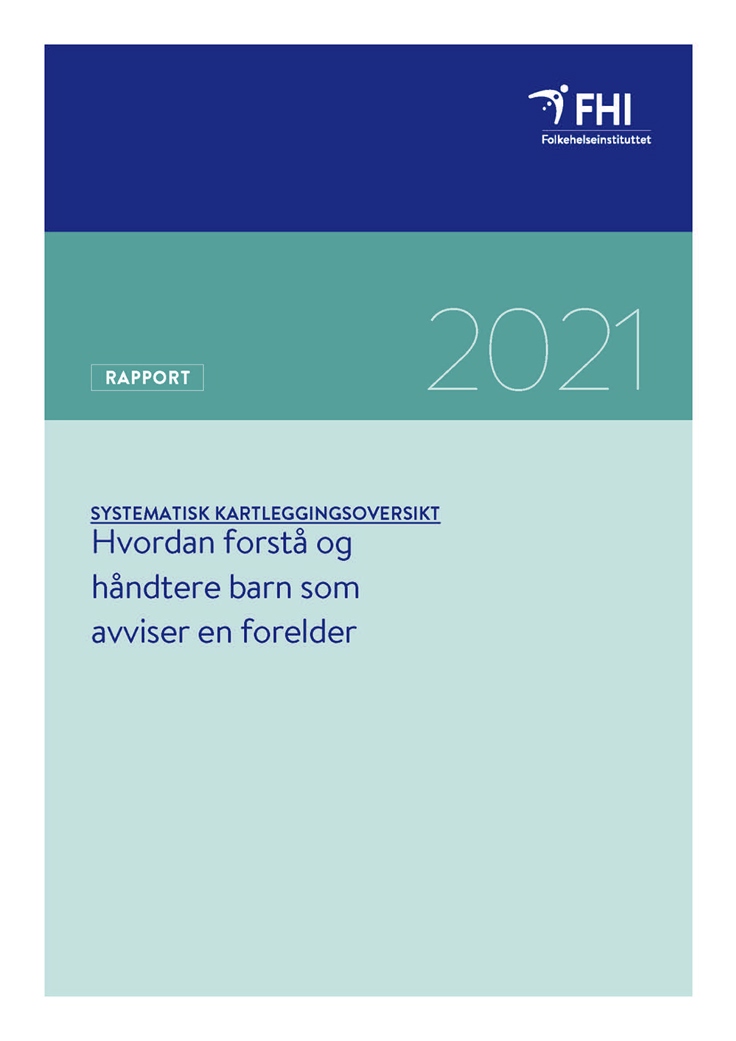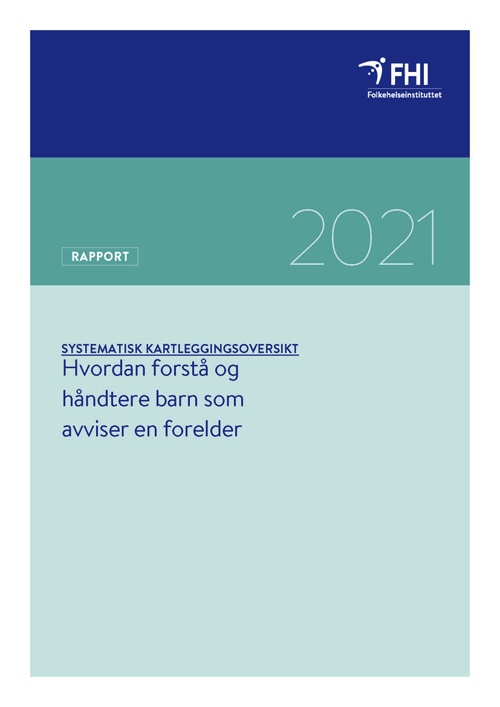Understanding and helping children who resist or refuse post-separation parental contact: A systematic mapping review
Mapping review
|Published
The aim of this project is to map and describe research about the reasons children resist or refuse to meet a parent, and to map and describe tools or interventions to identify, prevent and treat the refusal to spend time with a parent.
Key message
Parental separation is a serious event in a child’s life. In some cases, children may resist or refuse contact with one (or both) of their parents after a separation. Refusal to have contact means that a child, over time, expresses resistance to meet with one of the parents. The aim of this project is to map and describe research about the reasons children resist or refuse to meet a parent, and to map and describe tools or interventions to identify, prevent and treat the refusal to spend time with a parent.
To identify relevant studies published between 2000-2020, a research librarian searched in international databases, including MEDLINE, EMBASE and PsycINFO. Two researchers independently screened the studies’ eligibility according to the inclusion criteria.
We included one review article and 54 primary studies. Most studies were from the USA (n=38), used a cross sectional (survey) design (n=23), and the participants were children or adults talking about their experiences as a child (n=45). The majority of the studies examined parental alienation (n=48). The studies reported that the underlying reasons for parental alienation varies and that the strategies that are used are many and varied. The studies also reported a possible association between parental rejection and negative outcomes. We found specific tools or interventions pertaining to: different reasons for parental rejection (n=1) or levels of exposure to parental alienation (n=10), preventing parental alienation (n=1) and interventions to treat or deal with parental rejection (n=2) or parental alienation (n=3).
This systematic mapping review found a need for: empirical research on forms of parental rejection other than parental alienation; studies from other settings beyond the USA; and study designs that can test which interventions are effective.
Summary
We conducted a systematic mapping review. It provides an overview of the empirical research that met our inclusion criteria. The studies (publications) are presented individually. We neither critically appraised the methodological quality of the included studies nor analysed the results across the studies. This review gives an insight into and description of the research field and is not meant to be used to support evidence-based decision making. We did not take into consideration study authors theoretical or ideological perspective or their position in the debate around parental alienation syndrome as a diagnosis requiring treatment or a life event needing to be handled. It is outside the scope of this report to explore these theoretical and ideological debates occurring within this field of research.
Background
Parental separation is a serious event in a child’s life and has consequences for both the child(ren) and the parents. Children can experience feelings of grief, anger, sadness and insecurity due to the separation. Parental rejection is that a child, over time, expresses resistance to meet with one of their parents. There can be many reasons for this form of rejection and there exists a large variation between cases where a child rejects or does not want to meet with a parent after separation. Often the reasons for this are complex and it can be difficult to understand what lies behind the child’s actions. Parental rejection can have serious consequences for children’s mental health and some studies have reported an association with problems such as anxiety, depression, aggressive behaviour or developmental delays. In most instances, meeting and connection with both parents is considered the best for a child’s development, however, an evaluation of what is in the child’s best interest can be complicated.
The unit for child competence in the department of family services reports that therapists and intermediators in the department for family services are in need of more knowledge on how they can best understand and approach cases where a child refuses to meet with or rejects a parent after parental separation. Thus, there is a need for a systematic review that gives insight into this research topic. The purpose of this systematic mapping review is to map and describe the research about the reasons for parental rejection and tools or interventions to identify, prevent and handle parental rejection. Our mapping review focused on the following questions:
- What are different reasons for parental rejection and possible associations with pyscosocial challenges?
- Which tools exist for identifying different reasons for parental rejection and the degree of severity of parental rejection or alienation?
- Which interventions exist for preventing parental rejection from happening?
- Which interventions exist for dealing with parental rejection?
Method
We conducted a systematic mapping review in line with the guidance from Arksey and O’Malley, further developed by Peters and colleagues. We conducted a systematic search for studies in a number of electronic databases in November 2020. We searched for studies published from the year 2000 onwards. Two researchers independently screened the identified titles/abstract and thereafter full texts. We included studies that met the following criteria:
|
Inclusion criteria |
|
|
Population: (In prioritized order based on number of included studies) |
1. Children 16 and under who over time develop a meaningful resistance to contact and connection with a parent after parental separation (independent of custody arrangements) 2. Adults who present their experiences from when they were 16 or younger who over time develop a meaningful resistance to contact and connection with a parent after parental separation (independent of custody arrangements) 3. Parents and close family members of children who reject a parent 4. Support workers (brokers, employees in child services, case workers, family therapists) who contribute to the management of parental rejections cases |
|
Concept |
Parental rejection- when a child, over time, expresses a strong objection to meeting with one of its parents after parental separation |
|
Area of interest |
All reasons that can explain parental rejection by a child: All tools, mapping or methods that can identify or separate between causes for rejection and that can prevent it occurring; All interventions, strategies, methods, cooperation program, processes, tools to handle a child’s parental rejection i.e. methods to limit, reduce or treat parental rejection; Experiences of the different tools/interventions from the populations described above. |
|
Study design |
Empirical quantitative and qualitative primary studies and systematic reviews of empirical primary studies independent of study design. |
|
Language |
English |
|
Country |
Australia, Belgium, Canada, Denmark, Finland, France, Iceland, Italy, Ireland, The Netherlands, New Zealand, Norway, Portugal, Spain, The United Kingdom, Sweden, Germany, USA |
We extracted publication data, country, population characteristics, descriptions of outcomes and eventual comparisons as well as the results and authors conclusions from the included studies. We neither performed a synthesis of findings across studies nor evaluated their methodological quality.
Results
We assessed the titles and abstracts of 13 869 references. Of these, we considered 189 references as relevant and assessed them in full text. 94 publications met our initial inclusion criteria. In accordance with the project plan, together with the commissioner, we decided to narrow the inclusion criteria: we excluded publications of parents or support workers’ experiences. After assessing the publications based on the revised criteria, we included 55 publications (here referred to as studies).
The majority of the studies are from the USA (n=38), used a cross sectional (survey) study design (n=23), and examined children’s perspectives (n=22) or adults talking about their experiences as children (n=23). The type of parental rejection which was most studied was parental alienation (n=48). Further, the studies examined: different reasons for or the consequences of parental rejection (n=1)/ parental alienation (n=28); tools for identifying different reasons for parental rejection (n=1) or levels of exposure to parental alienation (n=10), preventing parental alienation (n=1) and interventions to treat or deal with parental rejection (n=2) or parental alienation (n=3).
Discussion
It is probable that the social and demographic differences between Norway and the countries where the included studies were conducted (primarily the USA) affect the transferability of the results. However, we only included studies from countries that are considered socio-culturally similar to Norway. Even though we did not identify any Scandinavian studies it is likely that the results are relevant for a Norwegian/Nordic context. While we identified ten studies about ways to treat or deal with parental rejection, there were no studies that examined the effectiveness of interventions using a randomised controlled study design. We also found no studies on preventive interventions. However, we identified two studies that explored the use of a risk assessment of parent’s potential for alienating behaviour. Most of the studies examined parental alienation. There is a need for more research on other forms of parental rejection.
The strengths of this systematic mapping review are the close cooperation with the commissioner concerning the project plan, our systematic literature searches, and the quality assurance process with the included studies. However, we did not synthesise the results from the included studies and therefore this is not a synthesis of research results such as in a systematic review. Further, we neither assessed the methodological quality of the included studies nor our certainty in the body of evidence. This means that the studies we included may have varying methodological quality, which can affect the certainty in the results. We did not search for grey literature and did not search for studies beyond the named databases. We had several research questions and broad inclusion criteria. Given the timeframe and resources available, therefore, there were challenges concerning the amount of data we could extract and categorise. In cooperation with the commissioner, we decided to complete a somewhat simplified mapping in the form of categorisation and tables with some presentation of findings across studies.
Conclusion
This systematic mapping review found a need for: empirical research on forms of parental rejection other than parental alienation; studies from other settings beyond the USA; and study designs that can test which interventions are effective.

